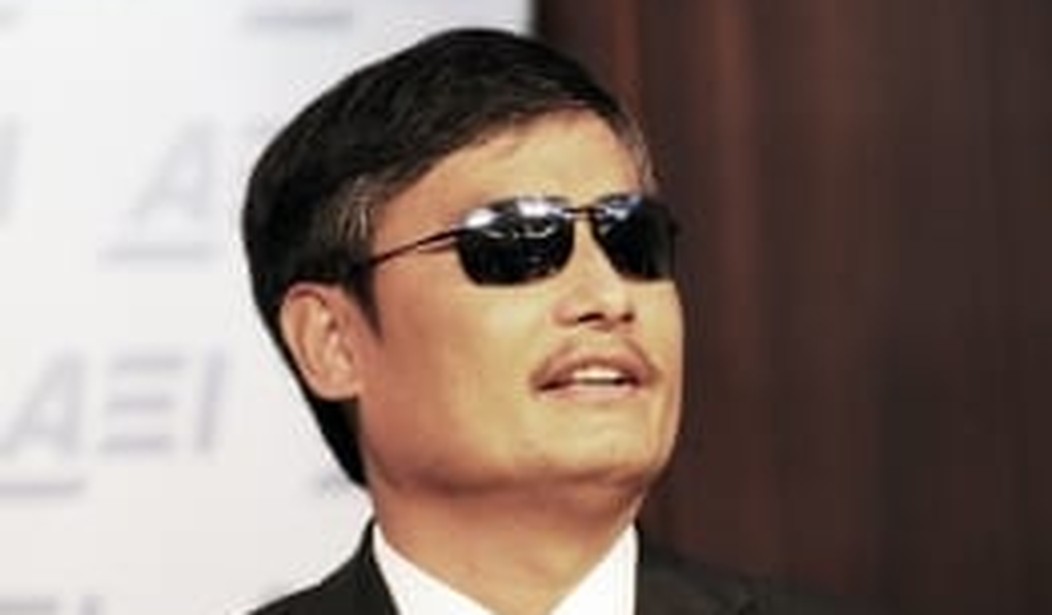WASHINGTON – Chen Guangcheng, a Chinese political activist and self-taught lawyer, urged democratic leaders of the world to support Chinese dissidents and take a harder line against the People’s Republic political class.
“Twenty-five years ago today, a great evil was done by those in power in China. They killed hundreds of their own people to silence them,” Chen said Tuesday at the American Enterprise Institute.
The event marked the massacre of pro-democracy students by the Chinese military on June 4, 1989, in Tiananmen Square. The Chinese government has never officially recognized the massacre or released a death toll, believed to be in the hundreds to thousands.
Speaking English in public for the first time, Chen said the Chinese government has avoided “admitting its evils” and “facing its history” to maintain one-party rule.
“They have tried to silence me, but I will not be silenced. I want to speak to you today in English, so no one will forget that terrible day,” he said.
Chen rose to prominence for his outspoken opposition to the communist government. Despite being totally blind since childhood, he audited classes and developed a career as a lawyer representing peasants on cases involving pollution, forced abortions under China’s one-child policy, and corruption.
In 2005, he organized a landmark class-action lawsuit against the authorities in Shandong province for the excessive enforcement of the one-child policy. As a result of the lawsuit, Chen was jailed for four years in 2006 and then placed under house arrest for “damaging property and organizing a mob to disturb traffic.”
“Twenty-five years later, instead of admitting its evils and facing history, the Communist Party of China continues to cover it all up, and continues its one-party dictatorship. Calls for justice have still not been answered. The criminals who ordered the crackdown have still not been held accountable. This is a deep grief for the Chinese people. This is a grief for the whole world,” he said.
Chen urged foreign governments to send Chinese citizens technology that would help them bypass Internet censorship. He also encouraged everyone to support activists and pro-democracy groups in China.
“To give future generations a free world, we must act now. Work with the human rights lawyers in China. Help the Internet activists. Partner with all statesmen who support democracy and freedom. Let us join hands and fight together,” he said.
Despite China’s tremendous economic progress in the last two decades, political reform has fallen by the wayside, he said.
Chen said the Chinese government spends about $11.7 billion a year in its attempt to stifle dissent. Even with these efforts, he said, “citizen activism has been growing” in China.
“Today, many Chinese people are beginning to awaken; they are overcoming their fear and working for democracy,” Chen said. “The Chinese [people] want change, but we must stop the Communist Party from brutalizing and suppressing [them].”
Zhou Fengsuo, one of the student leaders of the Tiananmen Square protest movement, urged Congress last week to step up funding for technologies to break online censorship in China.
“The life of the communist regime depends on controlling the Internet and blocking access of Chinese citizens to the outside world,” Zhou said.
Chen argued for a tougher stance against China’s political class, whom he says will only respond if their “privileges” are threatened.
“Look beyond China’s economic success and support the ordinary Chinese,” Chen said. “[Help] end Internet censorship. Help them break down the ‘Great Firewall of China.’ Stop receiving June 4 criminals as honored guests. Don’t let those who crush human rights enter your free, democratic countries. Deny them the warmth of your handshake, the warmth of your smile.”
“Evildoers won’t stop until they are held responsible. Dishonoring evildoers is not dishonorable. But honoring them honors their crimes,” he added.
Chen said a corrupt regime is not only a threat to the Chinese people, but a threat to everyone.
“A corrupt regime is a threat to us all, and just economically and militarily. It is a threat to our very human culture, our human civilization, and our universal human values,” he said.
Chen, known as the “barefoot lawyer” because of his village upbringing, said that if democratic movements were launched in China today, they would expand into every corner of society.
“At the rebirth of democracy in China, the whole world must stand firm. If we speak loudly and clearly, a free China, a democratic China, a China with a constitutional government will come to pass,” he said.
In 2012, Chen escaped house arrest and fled to the U.S. embassy in Beijing, where he appealed for refuge. After a diplomatic tussle between the two nations, the Chinese government allowed Chen to come to the United States to pursue his legal studies. He is a fellow in Human Rights at the conservative Witherspoon Institute and the Institute for Policy Research and Catholic Studies at the Catholic University of America.









Join the conversation as a VIP Member